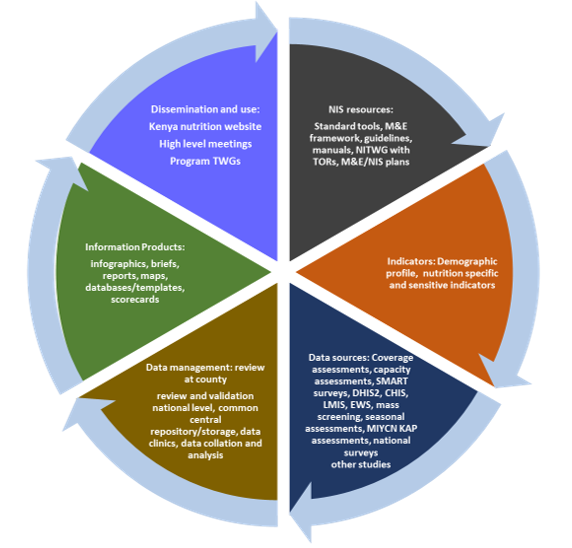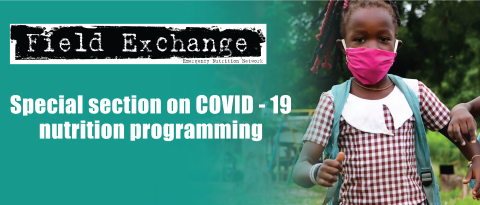Streamlining SMART survey processes to support the nutrition information system in Kenya
This is a summary of a Field Exchange field article that was included in issue 65. The original article was authored by Lydia Ndung’u, Lucy Maina-Gathigi, Lucy Kinyua, Hassan Ali Ahmed, Kibet Chirchir and Samuel Mahinda Murage
Lydia Ndung’u is a SMART Advisor for East Africa, Southern Africa and Yemen.
Lucy Maina-Gathigi is a Nutrition Officer with UNICEF Kenya, specialising in nutrition information systems.
Lucy Kinyua is a Monitoring and Evaluation Manager for the Kenyan Ministry of Health and the secretary of the Nutrition Information Technical Working Group.
Hassan Ali Ahmed is the Associate Director for Nutrition at Action Against Hunger Canada and a lead for the Global SMART Initiative.
Kibet Chirchir is a Nutrition Support Officer for the United Nations Office for Project Services.
Samuel Mahinda Murage is a Health Records and Information Officer working with the Kenyan Ministry of Health.
|
Since 2013, the processes for conducting Nutrition Standardized Monitoring and Assessment of Relief and Transitions (SMART) surveys in Kenya have been streamlined, harmonised and institutionalised, contributing to the development of a high quality, nationally-owned and led nutrition information system (NIS).
|
Background
National Nutrition Information Systems (NIS) are critical to inform timely, high quality nutrition responses. In recent years, the Kenya NIS has been developed to include clear guidelines and tools, as well as standardised methodologies and processes, to support national nutrition monitoring and evaluation (see Figure 1). Through this process, Nutrition Standardized Monitoring and Assessment of Relief and Transitions (SMART) surveys were identified as the key source of acute malnutrition data at population level. Efforts have therefore been made since 2013 to streamline the processes of SMART surveys so that they contribute to a high quality, nationally-owned and led NIS.
Figure 1: The Kenya Nutrition Information System

Actions to improve SMART surveys
The Nutrition Information Technical Working Group (NITWG), set up under the Kenya Nutrition Technical Forum led by the Ministry of Health (MoH), aims to strengthen the nutrition surveillance, monitoring and evaluation systems of the NIS. To achieve this, the NITWG has conducted several important actions since 2012 to improve the quality of data collected through SMART surveys across Kenya. These include:
- Mapping partner needs: Inventories and surveillance activities were undertaken at sub-national level within counties and informed the development of a survey calendar to coordinate partner activities. This process highlighted the need to link with other sectors and to align with other key assessments to ensure the optimal use of data.
- Developing guidelines and standardising processes: Guidelines and global standards were adapted and contextualised to the Kenya context, providing implementing partners with clear guidance for good practice. The NITWG team also developed standard templates for submitting results.
- Capacity building activities: Training on SMART surveys was carried out in 2014 and 2015 using a cascade approach to reach field-level government staff and to ensure standardised survey implementation.
- Validating survey methods and results: To ensure the quality and standardisation of nutrition surveys, a system has been put in place to review and approve survey methodologies ahead of implementation. After implementation, the preliminary results and final survey report are thoroughly reviewed and validated by the NITWG. While quality assurance activities were previously completed by partners and consultants, they are now conducted by officers from the MoH, thereby strengthening national capacity and ensuring sustainability.
- Management of a common repository: To provide oversight on data quality, the NITWG formed a common repository of raw datasets. Once approved by the NITWG, interested parties can access all validated nutrition surveys in the country from a government-managed website1 to inform real time programming and decision-making.
Achievements
As a result of the actions described, SMART survey processes are clearer, resource mobilisation efforts are better coordinated and there is no more duplication. Streamlining these processes has led to a number of other achievements, including:
- Increased government funding to conduct SMART surveys: The Government of Kenya has significantly increased its financial investment in surveys with county governments now directly investing and mobilising funds for surveys as part of their annual plans.
- Government-led survey implementation: The increased capacity among government staff has resulted in greater government ownership of survey management and results. County-level government staff are now leading surveys with minimal external support.
- Timely preparedness and response: The availability of SMART survey data has allowed for the early detection of deteriorating nutrition situations in the country to prompt early responses.
- Comparability over time and space: The standardised processes and field procedures implemented generate comparable data that is able to indicate when situations improve or deteriorate over time.
- Quality data is available and used: The survey validation process ensures that the majority of surveys conducted in Kenya demonstrate the highest level of rigour, reliability and quality, making Kenya a ‘centre of excellence’ on NIS.
- Collaboration with other sectors: To ensure that SMART survey results contribute to comprehensive situation analysis in Kenya, multiple sectors (food security, health and WASH) were consulted to identify the key indicators to include. Thus, SMART surveys are now considered a reliable/valid source of data by other sectors, raising the profile of the nutrition sector and providing a space for multi-sector engagement.
Lessons learned
In Kenya, a high-quality NIS infrastructure has been developed through investment in a government owned and sustained monitoring and evaluation framework for nutrition. Lessons learned from this process provide useful insights for countries hoping to strengthen their NIS processes.
- Standardised tools and methodologies allowed for more streamlined capacity-building efforts, enabled the uniformity, availability and quality of data and ensured comparability of results over time.
- Training government staff enabled the NITWG to retain a pool of technical staff able to pass on knowledge despite high staff turnover.
- The formation of task forces, including a SMART survey task force, improved turnaround time, allowed deeper interrogation of methods, processes and procedures and enabled targeted support where needed.
- Since the mandate of the NITWG ensures the support, mentoring and coaching of new NITWG members/teams, new entrants were able to build on lessons learned and develop high levels of expertise
- Maintaining consistency across activities and meetings, including switching to virtual meetings during the COVID-19 pandemic, allowed the NITWG to maintain progress and ensured that teams planning to have surveys and protocols validated could easily fit into a reliable schedule.
- Leadership and ownership by government and the institutionalisation of processes has ensured better results, product ownership and sustainable strategies. Focusing on building the capacity of government staff has also helped to strengthen their ownership of NIS processes.
Conclusions
Overall, the Kenya NIS has benefitted from having a clear monitoring and evaluation framework and well-defined coordination and quality control bodies. Based on the experiences of streamlining SMART survey processes to feed into the NIS, the key ingredients identified for a sustainable NIS include strengthening the capacity of government staff, succession planning and mentorship, coordinating efforts and resources and maintaining high standards and quality control frameworks.
For more information, please contact Lydia Ndungu at lydianyambu123@gmail.com
1http://www.nutritionhealth.or.ke/


